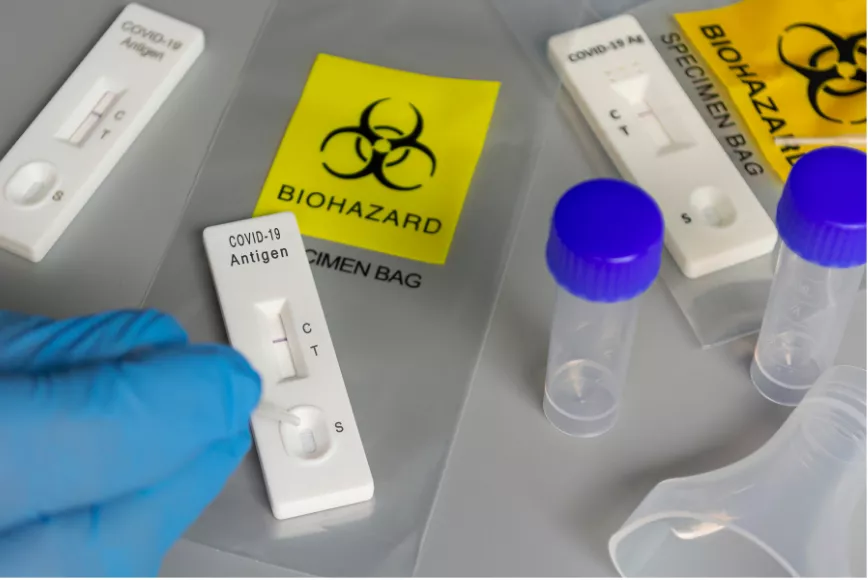The Long Covid Mystery Continues to Grow
December 6, 2023

Following an acute viral illness, some people experience persistent symptoms. These symptoms can last from days to weeks, even years, but there is little biological understanding of what causes them. Recovery from Covid-19 is no exception, and the post viral syndrome that emerges in some people who have recovered from acute Covid-19 has been called Long Covid. Despite an abundance of interest and research funding, Long Covid remains a mystery that only thickens as more studies emerge.
Last month an important paper appeared in the journal Nature that attempts to explain some of the biological and symptomatic details of Long Covid, but in many ways the research raises as many questions as it answers and begs the question of how findings in the blood and symptoms related to the brain may be related to each other.
Investigators from Yale and the Mount Sinai School of Medicine have been following a cohort of people with Long Covid and reported on immune and hormone system findings in them. They first noted that the most common symptoms in their group of Long Covid patients are fatigue, brain fog, memory difficulty, and confusion. Also common were problems regulating blood pressure. What is striking about this is that these symptoms are all related to functions of the nervous system, including the brain.
Low Cortisol Level Is a Striking Finding
‘Next, the researchers detailed a host of differences in various aspects of the immune system between patients who have Long Covid and control groups without Long Covid. But the most striking findings was low levels of the hormone cortisol in the Long Covid group.
Cortisol is a hormone secreted by the adrenal glands, located just above the kidney. It is involved in many biological functions including regulation of the immune system and the response to stressful events. In general, cortisol suppresses immune function and various medications derived from it are often used to treat illnesses in which the immune system is hyperactive (e.g., prednisone and dexamethasone). This includes acute Covid-19; some patients with severe illness are given medications related to cortisol to dampen down increases in immune system function that cause damage to multiple organs.
The intriguing thing about the low cortisol finding in Long Covid is that this hormone’s levels are regulated by the brain. Normally, when cortisol levels are low a hormone called corticotropin or ACTH is released from the brain’s pituitary gland, which stimulates the adrenal gland to release more cortisol. ACTH is itself regulated by a hormone called corticotropin releasing hormone, which originates in another part of the brain called the hypothalamus. The Mount Sinai-Yale research group found that ACTH levels were not elevated in their patients with Long Covid, as would have been expected because of their low cortisol levels. They speculated that the control mechanism for cortisol, which originates in the brain, “may be inappropriately blunted.”
Cortisol is usually released during periods of acute and physical stress, but one fascinating finding is that patients with posttraumatic stress disorder (PTSD), a psychiatric illness that results from exposure to severe emotional stress, have been shown in some studies to have low levels of cortisol, just as was seen in the study of patient with Long Covid.
Depression and Anxiety Also Common in Long Covid
Could it be that low cortisol levels in Long Covid provide a clue to what is going on with this mysterious illness? Is there a relationship between the stress of having acute Covid-19 and the biological findings in the psychiatric condition PTSD?
Another piece of this puzzle comes from recent studies finding that as many as two out of three people with Long Covid have evidence of anxiety, depression, and other mental health issues. There is a long history of studies showing disturbances in the systems regulating cortisol in these conditions as well. In an interview, psychiatrist Anna Dickerman of the Weill Cornell College of Medicine speculated that “Long Covid causes inflammation in the brain that can cause the release of cytokines (proteins that are secreted from certain cells in the immune system) that are known to cause…fatigue, low energy, and low motivation—symptoms which are also associated with depression and anxiety.
Putting all of this together, then, one possibility is that the immune system abnormalities that the Mount Sinai-Yale group identified are part of an inflammatory picture that affects the brain and other parts of the nervous system. This in turn causes the symptoms–fatigue, brain fog, confusion, anxiety, and depression– that are so common in patients with Long Covid. Dysregulation of the brain’s cortisol control system could reflect this general inflammation.
What’s In the Head?
The symptoms of Long Covid have been likened by some to those seen in conditions like myalgic encephalomyelitis/chronic fatigue syndrome (ME/CFS) and to those reported by some patients following acute Lyme disease. Like Long Covid, the physiological basis of these conditions has been very hard to pin down. One thing people with these conditions hate to be told is that it is “all in your head,” which they understandably see as a dismissal of the reality of their symptoms, which can be associated with substantial discomfort and life limitations.
Nevertheless, it is possible that some of the symptoms of these conditions do indeed originate “in the head” if it is true that post-infection brain inflammation is involved. For now, this is a speculative leap, but one that is based on impressive laboratory and observational studies that point to two things: first, that immune and hormone system function seem to be disrupted in Long Covid and second that many of the symptoms of Long Covid are related to nervous system function. A parsimonious explanation of these observations would be to put them together and conclude they are related.
We are still a long way from being able to translate such speculation, even when based on solid ground, into meaningful interventions to help people with conditions like Long Covid. This is extremely frustrating to the millions of people who are suffering from Long Covid symptoms for whom complicated findings about the immune system offer no immediate relief. And in the end, that frustration may itself be one of the causes of the high rates of depression and anxiety seen among patients with Long Covid.
This kind of uncertainty in understanding the biological roots of symptoms like those seen in Long Covid is not uncommon, especially when the syndrome involves the brain. Despite enormous advances in neuroscience in recent years, the human brain is so complex that it still defies the kind of basic biological understanding that we have about most other organs of the body. If at least part of Long Covid is indeed a brain illness, as seems very likely given the symptom profile, it will take a concerted effort of many kinds of scientists and clinicians to figure out what to do about it. Moreover, it will be necessary to overcome the stigma of the “it is all your head” kind of thinking and focus attention on that mysterious organ that resides in the head.
Related Posts

Misrepresentation Abound From Members of Congress
Posted in COVID
Beleaguered former head of NIAID Anthony Fauci has maintained great scientific rigor while being attacked by Congress. What the most recent hearing tells us about our nation's polarization and people's tolerance for uncertainty.

As the Data Roll In, We Get a Better Sense of What Worked During the Pandemic
Posted in COVID
While there are some things about COVID and the pandemic that are still unclear, there are many things we can be sure about, including the fact that masks work.

Political Partisanship Can Be Deadly
Posted in COVID
The authors of a new study find that political polarization was often the key factor in people's decisions about whether to mask up, socially distance, and/or get vaccinated.